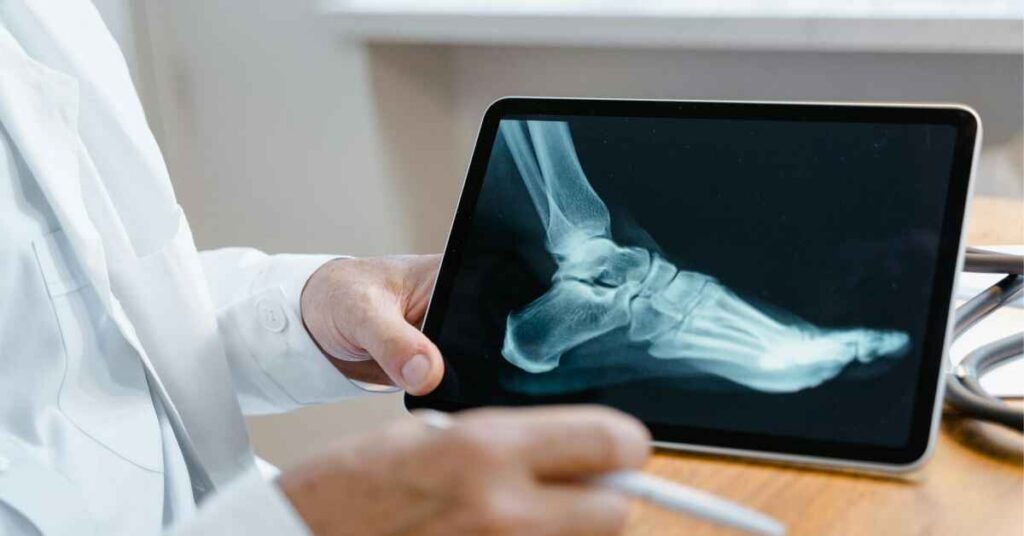
Is heel pain: a sign of cancer? This is a question of many people when they are suffering for continuous pain in their feet. Heel pain is often caused by common issues like plantar fasciitis or heel limbs. Sometimes it can point to more serious conditions like cancer. In this post, we’ll discuss when heel pain can be the sign of cancer, the symptoms to watch for, and when you should seek medical attention.
Is Heel Pain: A Sign of Cancer? Common Causes to Consider
At the very beginning of heel pain, we need not to suspect cancer. So, we should know the common cause of heel pain:
- Plantar Fasciitis: The most common cause of heel pain. It happens when the tissue of the bottom of your foot becomes sore.
- Heel Spurs: when standing or walking. Sometimes we feel pain in our feet when we standing or walking. This is because of the bony growths that develop on the heel bone and cause pain.
- Arthritis: Heel pain may feel because of joint inflammation, including in the feet.
- Tendinitis: Inflammation of the tendons, particularly the Achilles tendon, can cause heel pain.
- Bursitis: We may feel discomfort in our heel due to inflammation of the bursa (a small fluid-filled sac) that cushions the heel joint
Could Heel Pain Be a Sign of Cancer?

Cancer can sometimes cause heel pain, especially when it spreads to the bones in your foot or heel. We can consider two potential causes such as Bone cancer and metastatic cancer (cancer that spreads from other parts of the body).
- Bone Cancer: Sometimes we feel persistent pain in our feet but we think that it’s occur for a simple injury. But it can be the cause of cancer which may occur in the bones of the feet. The pain from bone cancer tends to be deep and constant, often deteriorating at night.
- Metastatic Cancer: Cancer from other parts of the body, like the lungs, breasts, or prostate, can spread to the bones in your feet and cause pain. This is known as metastatic cancer.
Symptoms of Cancer-Related Heel Pain
So, how can we suspect that our heel pain is a sign of cancer? There are some specific symptoms to take into consider:
- Persistent Pain: It could be a danger sign if the heel pain is constant. That means the pain doesn’t improve though we take rest or over-the-counter treatments.
- Pain at Night: Cancer-related pain often increases at night. If heel pain gets severe when lie down, it’s a warning sign.
- Swelling or Tenderness: Sometimes one may notice swelling, tenderness, or changes in the shape of heel. It could point to cancer or another serious condition.
- Unexplained Weight Loss or Fatigue: If you experience heel pain along with weight loss, fatigue, or other unusual symptoms, it may be related to cancer.
All the above red flags indicate it’s time to get checked by a healthcare professional.
When to Seek Medical Attention
Heel pain usually isn’t a reason to panic. But consider seeking medical attention if:
- The pain persists for more than a few weeks.
- It worsens despite rest and common treatments.
- You notice additional symptoms like swelling, bruising, or fever.
- You have a history of cancer or are at high risk of developing it.
When you suspect your pain might be related to cancer, no further delay for taking medical advice. Early detection of cancer can significantly improve treatment outcomes.
How Cancer-Related Heel Pain Is Diagnosed

Your doctor will likely perform several tests to determine whether your heel pain is caused by cancer. These may include:
- X-rays: These can reveal bone changes or tumors in the heel or foot.
- MRI or CT Scans: These detailed imaging techniques can help detect soft tissue tumors or bone involvement.
- Biopsy: If there’s suspicion of cancer, your doctor might recommend a biopsy to confirm the diagnosis.
Treating Heel Pain Linked to Cancer
Treatment for cancer-related heel pain depends on the type and stage of cancer. It often involves:
- Surgery: If a tumor is detected, surgery may be needed to remove it.
- Radiation Therapy: This may be used to shrink tumors or reduce pain caused by cancer.
- Chemotherapy: For cancers that spread to the bones, chemotherapy might be used to control the disease.
Managing pain is also crucial. Doctors may recommend pain medications, physical therapy, or other methods to help ease discomfort.
How Heel Pain Can Be Managed: Remedies and Home Solutions
While cancer is an unlikely cause of heel pain, most cases can be managed with proper care. Here are remedies to help ease heel pain:
General Remedies for Heel Pain
1. Elevation and Rest
- Elevation: Raise your foot above the heart level to reduce swelling.
- Rest: Avoid putting weight on your heel to allow it to heal.
2. Applying ice therapy
- Apply ice to the heel for 10-15 minutes several times a day to reduce inflammation and numb the pain.
3. Appropriate Footwear
- Wear supportive shoes that cushion the heel and provide good arch support.
- Consider using orthotic inserts for additional support.
4. Exercises
- Stretch the calf muscles and the bottom of your feet to ease tension.
- Achilles’ tendon stretches can also help improve flexibility and reduce pain.
5. Massage
- Gently massage the foot and heel to improve blood flow and relax the muscles.
- Use essential oils like peppermint or eucalyptus for added relief.
Home Remedies for Pain Relief
Here are some effective home remedies specifically for heel pain:
1. Epsom Salt Soak
- Add Epsom salt to a warm footbath and soak your feet for 15-20 minutes. The magnesium helps relax muscles and reduce inflammation.
2. Warm Compress
- Use a warm compress to soothe stiff muscles and improve circulation if the pain isn’t due to inflammation.
3. Over-the-Counter Pain Relief
- Nonsteroidal anti-inflammatory drugs (NSAIDs) like ibuprofen can help manage pain and inflammation.
- Topical creams or gels with pain-relieving properties can also provide direct relief.
4. Foot Supports
- Heel cups or pads can cushion the heel and reduce shock when walking, helping to manage pain.
5. Weight Management
- Losing weight, if necessary, can reduce pressure on your feet and help prevent further pain.

Conclusion:
In most of the cases, this type of pain is not related to cancer. However, if you experience persistent pain, swelling, or other concerning symptoms, it’s vital to consult a doctor. Early detection is important. Though cancer-related heel pain is rare, it’s always need to be cautious. By addressing the pain early with proper treatments and remedies, you can manage most causes of heel pain effectively.
Frequently Asked Questions (FAQs)
1. Can heel pain be a sign of cancer?
Heel pain is rarely a sign of cancer. However, if you experience persistent, unexplained pain, especially with other symptoms like weight loss, night pain, or swelling, it’s important to seek medical advice. Cancer can spread to the bones, including the heel, but this is very uncommon.
2. What causes sudden heel pain?
Sudden heel pain can be caused by conditions like plantar fasciitis, Achilles tendonitis, heel spurs, or injury. It can also occur due to overuse or wearing improper footwear. Rest, ice, and supportive footwear can help manage sudden heel pain.
3. How do I know if my heel pain is serious?
If your heel pain lasts for weeks without improvement, worsens at night, or is accompanied by other symptoms like swelling, weight loss, or pain spreading to other areas, it may be a sign that you need to consult a doctor.
4. Can heel pain be related to arthritis?
Yes, heel pain can be a symptom of arthritis. Conditions like rheumatoid arthritis or osteoarthritis can affect the joints in the foot, leading to heel pain. A healthcare provider can help determine if arthritis is the cause.
5. What are the best shoes for heel pain?
Shoes with good arch support and cushioning are ideal for managing heel pain. Look for shoes with a thick, supportive sole and avoid high heels or shoes with minimal support. Orthotic insoles can also help provide additional cushioning.
6. What are some home remedies for heel pain?
Some effective home remedies include:
- Resting and elevating the foot
- Applying ice for 15-20 minutes several times a day
- Using supportive footwear and orthotic insoles
- Stretching exercises for the calves and feet
- Soaking in an Epsom salt bath
7. Can heel pain go away on its own?
In many cases, heel pain can improve with rest, proper footwear, and home remedies. However, if the pain persists for several weeks or worsens, it’s important to see a healthcare professional to rule out more serious conditions.
8. How can I prevent heel pain in the future?
To prevent heel pain, make sure to wear shoes with good support, avoid standing or walking for long periods without breaks, stretch your feet and calves regularly, and maintain a healthy weight to reduce pressure on your feet.
9. How can you tell the difference between cancer-related heel pain and plantar fasciitis?
Cancer-related pain tends to be persistent, deep, and worsening, especially at night. Plantar fasciitis typically causes pain with the first steps in the morning and improves with movement.
10. What tests are done if heel pain might be cancer?
X-rays, MRIs, and biopsies are commonly used to diagnose cancer-related heel pain.














